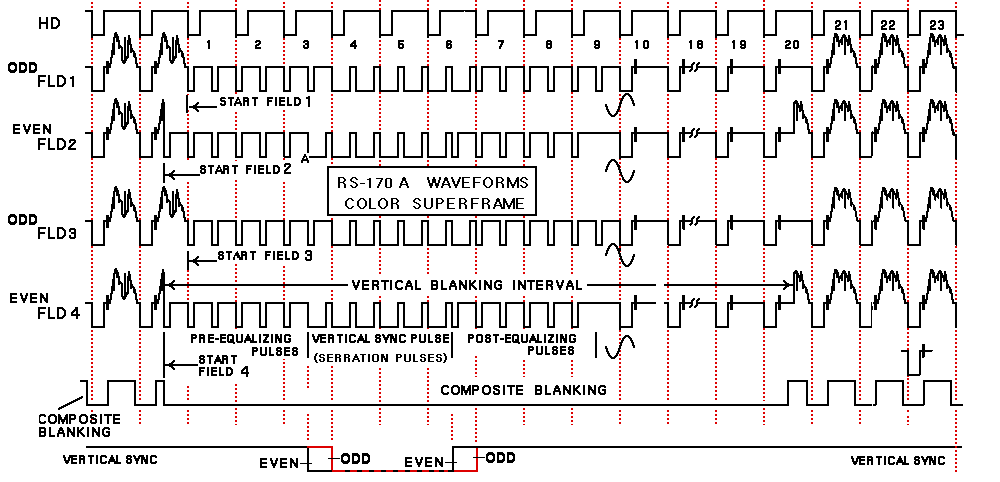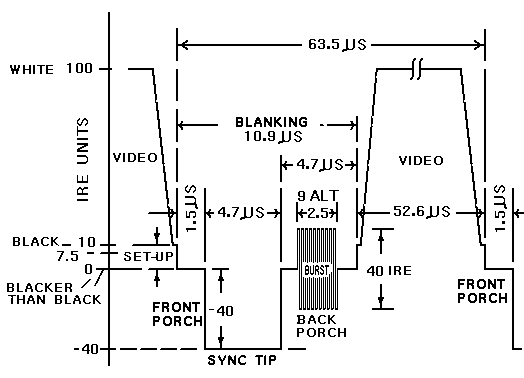


Harold M Hallikainen says:
The color subcarrier frequency is chosen such that the black and white dots produced by the color subcarrier appear as white and black dots in the next frame. [ed: every second field (odds and evens) has opposite chroma polarity] Your eye then averages these out removing the effects of the color subcarrier on b/w television receivers.
Dave Thompson says:
NTSC vertical sync was designed to be easily implemented on very cheap and primitive hardware, thus, it's just a little bit funky! What happens is this.Each frame takes up 525 lines' worth of time, and believe it or not, each field is exactly 262.5 lines long. The magic of vertical sync happens during nine lines' worth of time at the top of each field, called the vertical interval. Three lines' worth of time is spent sending six pre-equalization pulses. Then three lines' worth of time is spent sending six actual vertical sync pulses. Finally three lines' worth of time is spent sending *either* six or seven post-equalization pulses. You probably already guessed that it is the second field that gets the extra post-eq pulse and its purpose is to account for a half line offset.
Inside even the most ancient TV set is a PLL that locks to the horizontal sync pulses in order to accomplish horizontal sync. In order to make sure that the PLL wouldn't lose sync, the NTSC standard guarantees that a continuous stream of pulses shall arrive at the horizontal sync rate. But there's half lines in there! Riiight. In order to get that to work, the pulse rate is doubled up temporarily during the vertical interval.
In terms of horizontal sync, here's what the TV set sees. First, frame 0 begins. There are 6 pre-eq pulses, 6 vertical synch pulses, and 6 post-eq pulses, all at double the horizontal scan rate, taking up the first nine lines' worth of time. Only the first and every other subsequent pulse is regarded by the PLL. In other words, the PLL locks on to every other pulse, at the horizontal frame rate. After those first nine lines, normal scan lines are sent, with just one horizontal sync pulse each. The PLL stays locked to those. At the bottom of the field, line 262 starts as usual, but halfway through the scan line, boom!, here comes the first pre-eq pulse for field 1.
This first pre-eq pulse of field 1 is of course completely out of phase from the other horizontal sync pulses and therefore it will be missed by the PLL. But that's okay because the eq pulses come at double the horizontal scan rate. So, the second and every other subsequent pulse is regarded by the PLL. The seventh post-eq pulse brings the whole system back into sync so that the tenth line of field 1 is consistent phase-wise with the lines in field 0. It's really a pretty clever design for the 1930s! [The president of the company where I work might take umbrage: he was in on the design and certainly the engineers who participated in the birth of television were no slouches!]
For vertical sync detection, also inside the ancient TV is a simpleminded low pass filter. The pre-eq and post-eq pulses are mostly "black" level with fleeting sync level, so the average voltage for those three-line intervals is relatively high (close to .3v for black level). In between there are the three lines' worth of vertical sync pulses which are very high duty cycle into the sync voltage range, and average closer to 0 volts. The vertical sync pulses are the only part of the entire waveform with an average voltage anywhere near 0 volts, so they are hard to miss, even with primitive tube circuits ;^) While some of today's TVs ignore some of the pulses, it is easy to generate the standard NTSC signal, and of course that is recommended.
So, to recap:
Field 0 contains 262.5 lines, as follows.
- 3 lines: 6 pre-eq pulses
- 3 lines: 6 vertical sync pulses
- 3 lines: 6 post-eq pulses
- 253 lines: normal scan lines (many of these are invisible and some are reserved for closed-caption data, cable tv scrambler data, etc... but so far as sync is concerned, these lines are all "normal" scan lines)
- .5 lines: the last line of the field quits right in the middle!
Field 1 contains 252.5 lines, as follows.
- 3 lines: 6 pre-eq pulses
- 3 lines: 6 vertical sync pulses
- 3.5 lines: 7 post-eq pulses
- 253 lines: normal scan lines
Video Signal specs
See also:
/techref/io/video/ntsc.htm Correction, just to remove any confusion on the page ntsc.htm, near the bottom.+
In the summary: "Field 1 contains 252.5 lines, as follows" 252.5 should obviously be 262.5
Questions:
| file: /Techref/io/video/ntsc.htm, 9KB, , updated: 2010/12/10 21:17, local time: 2025/10/29 08:47,
216.73.216.99,10-3-83-201:LOG IN
|
| ©2025 These pages are served without commercial sponsorship. (No popup ads, etc...).Bandwidth abuse increases hosting cost forcing sponsorship or shutdown. This server aggressively defends against automated copying for any reason including offline viewing, duplication, etc... Please respect this requirement and DO NOT RIP THIS SITE. Questions? <A HREF="http://www.piclist.com/techref/io/video/ntsc.htm"> National Television Systems Committee Video Display Signal IO</A> |
| Did you find what you needed? |
|
o List host: MIT, Site host massmind.org, Top posters @none found - Page Editors: James Newton, David Cary, and YOU! * Roman Black of Black Robotics donates from sales of Linistep stepper controller kits. * Ashley Roll of Digital Nemesis donates from sales of RCL-1 RS232 to TTL converters. * Monthly Subscribers: Gregg Rew. on-going support is MOST appreciated! * Contributors: Richard Seriani, Sr. |
Welcome to www.piclist.com! |
.